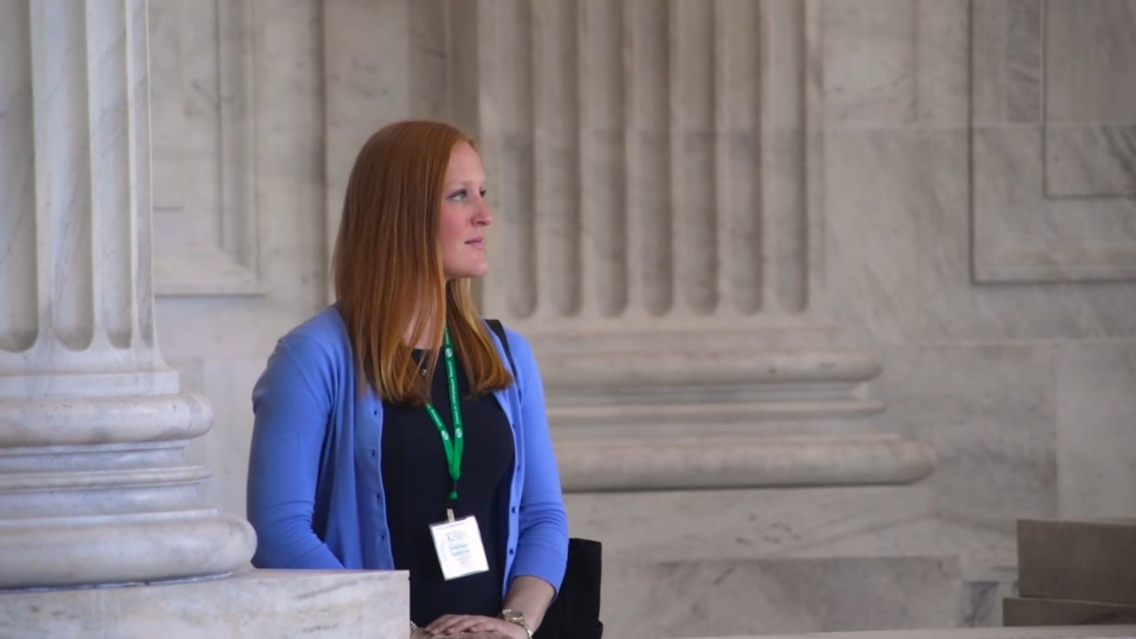Middlebury Senior Presents Neuroscience Research at Posters on the Hill [video]
MIDDLEBURY, Vt. — Middlebury senior Kristin Knutzen recently presented findings from her independent research at the highly selective Posters on the Hill event in Washington, D.C. The annual two-day event, sponsored by the Council on Undergraduate Research (CUR), took place April 20 at the U.S. Capitol Building and featured the work of 60 elite undergraduate students from across the country.
Knutzen’s research on aneurysms stemmed from an internship she completed last summer at Dartmouth Hitchcock Medical Center (DHMC) under the supervision of Dr. Robert J. Singer, an endovascular neurosurgeon. During the internship, which was funded by Middlebury’s Center for Careers and Internships, Knutzen began her days early, making rounds and observing brain surgeries, then later in the day building a database of patients for Singer’s research on causes and surgical treatments of aneurysms.
Singer was not surprised that Knutzen’s work led to the Posters on the Hill honor. “She’s a highly motivated student who did an excellent job in compiling our database for patients with brain aneurysms and other types of stroke,” he said. “She also spent a lot of time on the clinical service and was an active participant in our conferences and neurosurgical education program.”
By summer’s end, Knutzen, a St. Paul, Minnesota native, and a fellow intern had amassed a database of more than 200 patients–creating the foundations for a long-term DHMC study about the variables that can lead to aneurysms or help predict how effective surgery might be. With Singer’s permission, Knutzen brought her data back to Middlebury and analyzed it further during the fall semester for her senior research project in neuroscience.
“What I was ultimately looking at was either factors that would predict aneurysm development and rupture or outcomes of two different types of treatment,” said Knutzen. “Going forward, I think the conversation around predictive factors is going to be a lot more relevant,” she said. “Predictive factors are much more important– looking at things like genetic susceptibility to aneurysms, the fact that they occur more frequently in women than in men, and what kinds of medications could either trigger or prevent the occurrence of an aneurysm.”
Corroborating previous research findings is a vital step in the scientific process, Knutzen notes. “An exciting part of my research was finding a few variables that were statistically significant, which confirmed the findings of earlier studies,” she said.
Knutzen, a neuroscience major with a minor in studio art, is not the first Middlebury student to have been accepted to Posters on the Hill, but it’s always an honor for any institution, says Professor of biology Tom Root, who directs the College’s neuroscience program. He says Knutzen’s research stood out for a couple of reasons.
“It’s a clinical project, first of all, and it’s rare for a student to work with patients, doing something medical of significance beyond just shadowing doctors,” said Root. “The second thing was that the data was extraordinarily good. This data represents patients in the hundreds, so it was clear she’d be able to do something of a scientific nature really well.”
With support from Middlebury’s Undergraduate Research Office, Knutzen traveled to D.C. in April to present her findings to an audience of members of Congress, congressional staff, federal government officials, academics and other researchers. CUR’s annual Posters on the Hill event is also an opportunity for lawmakers to see how federal programs and dollars impact students and faculty, and to learn about the value of undergraduate research.
Knutzen has considered medical school in her future, but has delayed that decision for now, opting instead to focus on public health. She has been accepted to the Master’s in Public Health program at the Dartmouth Institute for Health Policy and Clinical Practice, which she starts in July.
Reporting by Stephen Diehl; Video produced by Benjamin Savard and Stephen Diehl


